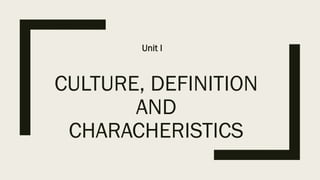1. culture, its definition & characteristics
- 2. Nature of Culture: Ō¢Ā Abstract Concept Ō¢Ā Narrow sense: Activities as a dance, drama, music and festivals Ō¢Ā True sense: Knowledge, Belief, Art, Morals, Law, Customs and other capabilities and habits acquired Ō¢Ā thoughts and behavioural patterns through language and other form of symbolic interaction Ō¢Ā Changes gradually Ō¢Ā ŌĆśA Culture is the configuration of learned behaviour and result of behaviour whose component elements are shared and transmitted by the member of particular society.ŌĆÖ - Ralph Linton (1945:21)
- 3. Characteristics of Culture: Ō¢Ā Learned Ō¢Ā Shared Ō¢Ā Trans generational Ō¢Ā Symbolic Ō¢Ā Patterned Ō¢Ā Adaptive Ō¢Ā Purpose Ō¢Ā Pervasive
- 4. CultureŌĆÖs Consequences on Different Aspects of Business Multiculturalism Spreading Cross- culture Literacy Managing Diversity Culture & Competitive Advantage Removing Cross- Cultural Illiteracy
- 5. Ō¢Ā Spreading Cross- Cultural Literacy Ō¢Ā Removing Cross- Cultural Illiteracy Ō¢Ā Cultural & Competitive Advantage Ō¢Ā Managing Diversity
- 6. Personality of Successful Negotiator Ō¢Ā Pleasing Ō¢Ā Encouraging Ō¢Ā Associative Ō¢Ā Open Ō¢Ā Powerful (Leader, Authoritative) Ō¢Ā Impressive Ō¢Ā Friendly Ō¢Ā Knowledgeable Ō¢Ā Communicative Ō¢Ā Ability to keep secrets Ō¢Ā Confident Ō¢Ā Hard Working Ō¢Ā Team man
- 10. Pre- negotiation Ō¢Ā Identify contents of the deal Ō¢Ā Create alternatives Ō¢Ā Put yourself in their shoes Ō¢Ā Gauge the appropriateness of the Message Ō¢Ā Build up the Relative power
- 11. Face- to- Face Negotiation Ō¢Ā Selection of Negotiator Ō¢Ā Expendable person Ō¢Ā Individual Vs Team
- 12. Post Negotiation Ō¢Ā Closing Negotiation Ō¢Ā Get Tax & Legal Advice Ō¢Ā Agreement preparation Ō¢Ā Anticipating for Final Approval
- 13. Negotiation Process and Specifies of International Environment Personal Behaviour of Negotiator Organisational Culture Domestic Business Environment International Business Environment
- 14. Ō¢Ā Environmental Context 1. Political & Legal Environment 2. Internal Economics 3. Foreign Government & Bureaucracy 4. Instability 5. Ideology 6. Culture 7. External Stakeholders Ō¢Ā Immediate Context 1. Relative Bargaining Power 2. Level of Conflicts 3. Relationship between negotiators 4. Desired outcome 5. Immediate stakeholders














